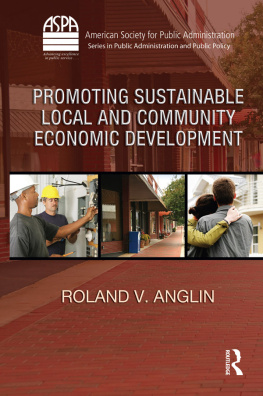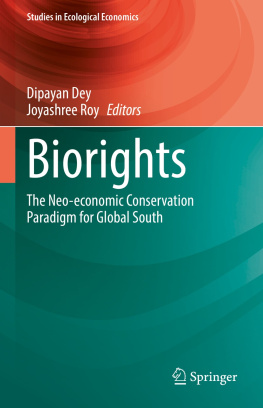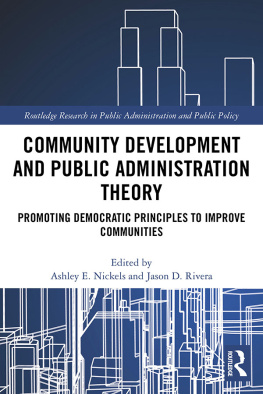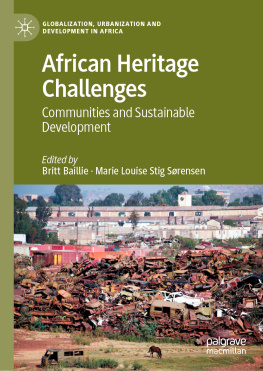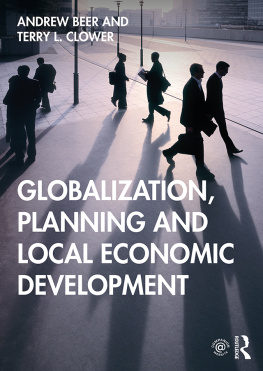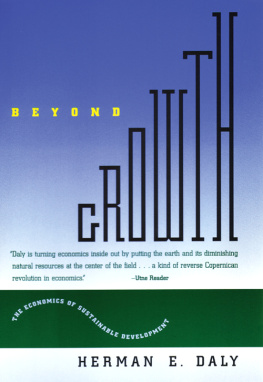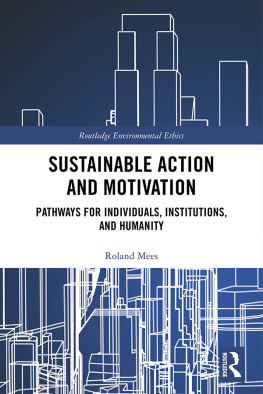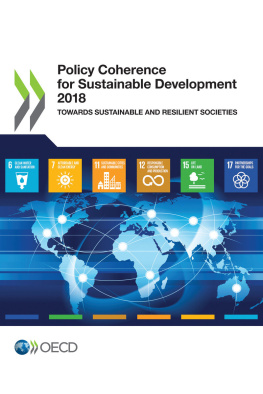PROMOTING SUSTAINABLE LOCAL AND COMMUNITY ECONOMIC DEVELOPMENT
American Society for Public Administration
Book Series on Public Administration & Public Policy
Editor-in-Chief
Evan M. Berman, Ph.D.
National Chengchi University, Taiwan
Mission: Throughout its history, ASPA has sought to be true to its founding principles of promoting scholarship and professionalism within the public service. The ASPA Book Series on Public Administration and Public Policy publishes books that increase national and international interest for public administration and which discuss practical or cutting edge topics in engaging ways of interest to practitioners, policy-makers, and those concerned with bringing scholarship to the practice of public administration.
Promoting Sustainable Local and Community Economic Development, Roland V. Anglin
Government Contracting: Promises and Perils, William Sims Curry
Managing Public Sector Projects: A Strategic Framework for Success in an Era of Downsized Government, David S. Kassel
Organizational Assessment and Improvement in the Public Sector, Kathleen M. Immordino
Major League Winners: Using Sports and Cultural Centers as Tools for Economic Development, Mark S. Rosentraub
The Formula for Economic Growth on Main Street America, Gerald L. Gordon
The New Face of Government: How Public Managers Are Forging a New Approach to Governance, David E. McNabb
The Facilitative Leader in City Hall: Reexamining the Scope and Contributions, James H. Svara
PROMOTING SUSTAINABLE LOCAL AND COMMUNITY ECONOMIC DEVELOPMENT
ROLAND V. ANGLIN
First published 2011 by Taylor & Francis
Published 2019 by Routledge
52 Vanderbilt Avenue, New York, NY 10017
2 Park Square, Milton Park, Abingdon, Oxon OX14 4RN
Routledge is an imprint of the Taylor & Francis Group, an informa business
2011 Taylor & Francis
All rights reserved. No part of this book may be reprinted or reproduced or utilised in any form or by any electronic, mechanical, or other means, now known or hereafter invented, including photocopying and recording, or in any information storage or retrieval system, without permission in writing from the publishers.
Trademark notice: Product or corporate names may be trademarks or registered trademarks, and are used only for identification and explanation without intent to infringe.
Library of Congress Cataloging-in-Publication Data
Anglin, Roland, 1959
Promoting sustainable local and community economic development / Roland V.
Anglin.
p. cm. (American Society for Public Administration book series on public
administration & public policy)
Includes bibliographical references and index.
ISBN 978-1-4200-8810-6 (hardcover : alk. paper)
1. Community development. 2. Economic development. I. Title. II. Series.
HN49.C6A55 2011
338.927091732dc22
2010026746
ISBN: 978-1-4200-8810-6 (hbk)
ISBN: 978-1-3150-8940-9 (ebk)
Typeset in AGaramondPro
by Apex CoVantage, LLC
Revitalizing central business districts and attracting new businesses to improve local economies suffering decline define the parameters of local economic development in the United States. Of course the underlying argument is that growing local economies through corporate attraction or supporting local entrepreneurs results in jobs. In reality, this simple, enduring calculus is never enough to address the multiple and often complicated challenges of unemployment and concentrated poverty.
Local economic development strategies and tools such as tax increment financing, tax abatements, Business Improvement Districts, and enterprise zones have their place. These strategies, however, are not the focus here. Over the last 40 years, conventional public management thought on place and people revitalization has greatly expanded to include strategies and tools that rebuild communities and neighborhoods along with rebuilding central business districts. These emerging strategies and tools combine traditional incentives for economic development with institutional arrangements that share the responsibility for development beyond the business community.
The difference between what is now termed community economic development (CED) and traditional local economic development practice is the priority placed on community involvement in economic development partnerships between the private sector and government. Innovation and innovative practices are often found in government support for organizational arrangements that promote cooperation and diffusion of benefits to communities outside the central business district. Increasingly, local economic development now incorporates policies geared toward developing the primary unit of place: the local community or neighborhood. Neighborhoods with a good quality of life, good housing, and productive people are the foundation of place and regional development.
The accomplishments of community economic development are significant. In aggregate, the field is a leader in producing affordable housing, training the unemployed, and providing capital and advice for low-income people seeking to escape poverty through self-employment.
As the globalization of capital proceeds, an increasing number of communities, states, and regions not normally placed in the distressed category will need the lessons learned by CEDs over the years to adjust to changing economic and demographic circumstances.
A good example is the current immigration pattern to the United States, which is changing the face of nonurban communities all over the country. This pattern runs counter to previous waves of immigration, which saw cities as ports of entry to the rest of the country. Immigrants are passing over cities to find opportunity in suburban and rural communities. These communities face age-old problems of unemployment, crime, and concentrated poverty, with few roadmaps to guide public managers and other stakeholders.
Managing the effects of physical blight and concentrated poverty is no longer unknown to public policy. This is not to say that we can eliminate poverty or physical blight, which America seems to be unwilling to admit to as a nation. We constantly look for the magic bullet or the comprehensive solution to place decay and poverty. There is no such solution, but we do have partial solutions that can be applied and connected in a thoughtful fashion.
I wrote this book for all who wish to see strong local neighborhoods and communities. Serving in multiple roles as a practitioner and applied academic has given me a unique vantage point from which to see community economic development practices grow over time in size, scale, and impact. Its accomplishments are often underrated and its ability to solve the problems of poor communities is sometimes clouded by outsized expectations. I hope this book serves as a reference for elected and administrative leaders needing to survey the breadth of innovative place and people development practices. Although it is not a how to book, the lessons and examples are presented at both a general and a textured level so that practitioners, public managers, and others can see innovative ways to change, influence, and, I hope, improve the economic development process. A Resource Guide is included at the end of the book for readers who may want a more expansive understanding of community economic development. Knowledge about the fieldand what worksis growing, but not always publicized and accessed by a general audience. The sections goal is to provide a wide range of thought, best practices, and strategies, including a compilation of leading national and international organizations, programs aimed at poverty reduction and community economic development, as well as a national and international bibliography on innovative efforts to build communities and economic opportunity.



